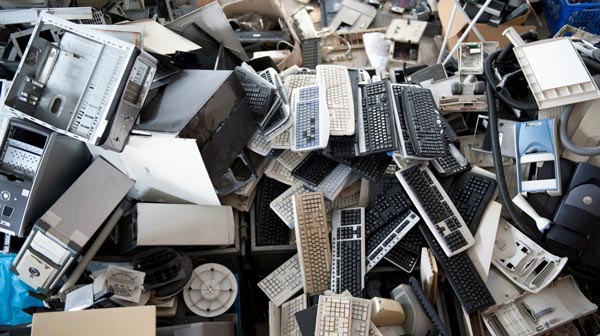Safeguard Your Ecological Commitment: Electronic Devices Reusing with R2 Certification
Wiki Article
Master the Needs of R2 Accreditation to Make Certain Sustainable Service Practices
At the leading edge of this movement is the R2 accreditation, an extensive requirement that sets the bar high for electronics recyclers and refurbishers. As companies aim to line up with ecologically mindful methods, grasping the demands of R2 accreditation is paramount. In a world where sustainability is no longer a plain buzzword but an organization important, delving right into the ins and outs of R2 qualification is a calculated move that can lead the means for lasting success and favorable environmental impact.Value of R2 Qualification
Attaining R2 Accreditation is crucial for services aiming to demonstrate their commitment to lasting and accountable digital waste management practices. This qualification, developed by SERI (Lasting Electronic Devices Recycling International), establishes the criterion for accountable recycling practices in the electronic devices sector. By getting R2 Certification, services signal to their stakeholders that they abide by rigorous environmental, health and wellness, and safety laws while handling digital waste.One of the key reasons R2 Certification is essential is its emphasis on sustainability. With digital waste being a considerable international worry, businesses require to showcase their commitment to minimizing the environmental influence of their operations. R2 Qualification requires firms to execute procedures that ensure the appropriate handling, repair, and recycling of electronic waste, consequently contributing to the circular economic situation and decreasing the build-up of e-waste in land fills.
Additionally, R2 Qualification enhances a company's online reputation and trustworthiness. In today's eco conscious market, companions and customers are increasingly seeking to team up with businesses that prioritize sustainability. By accomplishing R2 Qualification, companies can distinguish themselves as leaders in accountable e-waste administration, obtaining an one-upmanship and attracting like-minded stakeholders.
Secret Parts of R2 Requirements

Steps to Get R2 Certification
To certify for R2 Certification, companies have to meticulously demonstrate conformity with a collection of strict requirements and standards. The process of obtaining R2 Accreditation entails several essential actions. The very first step is to familiarize oneself with the R2 Requirement and its demands. This consists of recognizing the concepts of responsible recycling, data safety, environmental management, and employee health and safety that form the foundation of the accreditation.Following, companies require to evaluate their existing methods and procedures to identify any kind of spaces that need to be dealt with to satisfy the R2 Criterion. find more info This may include implementing brand-new treatments, buying training programs, or making adjustments to existing operations. When any kind of deficiencies are corrected, organizations can proceed to create a comprehensive administration system that straightens with the R2 requirements.
Complying with the execution of the required modifications, organizations should go through a third-party audit to validate their conformity with the R2 Standard (r2 certification). This audit is carried out by an approved certification body and includes a detailed review of the organization's facilities, treatments, and documents. Upon effective conclusion of the audit, businesses can receive their R2 Accreditation, showing their dedication to liable and lasting business practices
Benefits of R2 Compliance
Services that follow R2 conformity requirements can open a myriad of benefits in today's lasting service landscape. Among the key advantages of R2 conformity is improved reputation and online reputation. By meeting the strenuous requirements of the certification, firms can show their dedication to liable digital waste administration, which read here can instill trust among stakeholders, customers, and companions. Furthermore, R2 compliance can result in cost financial savings via enhanced performance in handling digital waste. By applying proper recycling and refurbishment techniques, services can minimize garbage disposal expenditures and possibly create profits from recouped products. Furthermore, R2 compliance advertises ecological sustainability by making sure that electronic waste is taken care of in an environmentally friendly way, reducing the impact on garbage dumps and natural sources. This commitment to sustainability can also attract eco conscious customers and partners, offering an one-upmanship on the market. Generally, achieving R2 compliance not only assists companies fulfill regulative requirements however likewise fosters a society of ecological responsibility and operational quality.Keeping R2 Certification
Showing a continued dedication to liable electronic waste management techniques, companies must concentrate on the careful process of maintaining R2 certification. Preserving R2 accreditation includes regular audits, interior evaluations, and continuous enhancement efforts to make certain compliance with the strict requirements established forth by the Responsible Recycling Practices (R2) criterion. Organizations needs to stay watchful in checking their electronic waste administration processes, information safety and security actions, and general environmental efficiency to maintain their R2 qualification condition.Regular training and education and learning for staff members are important to preserve R2 qualification, as staff participants need to be knowledgeable about the most recent finest practices and market standards. Maintaining thorough documents and documentation of electronic waste recycling activities, downstream vendors, and internal procedures is critical for demonstrating conformity throughout audits.
In addition, organizations need to actively engage with their supply chain partners and vendors to make sure that all entities included in the digital waste management process follow R2 requirements. By cultivating a society of transparency, liability, and continual improvement, organizations can successfully maintain their R2 accreditation and support their dedication to lasting service practices.
Final Thought

Accomplishing R2 Accreditation is essential for companies aiming to show their commitment to liable and sustainable digital waste management methods. By obtaining R2 Qualification, organizations signal to their stakeholders that they adhere to strict environmental, health, and security guidelines while taking care of electronic waste.
Upon successful completion of the audit, organizations can obtain their R2 Certification, showing their dedication to sustainable and accountable organization practices.
Maintaining R2 certification entails regular audits, interior evaluations, and continuous improvement initiatives to guarantee compliance with the stringent needs established forth by the Accountable Recycling Practices (R2) requirement. By comprehending the essential parts of R2 standards, taking the necessary actions to get accreditation, and enjoying the benefits of R2 conformity, companies can show their commitment to accountable electronic waste management.
Report this wiki page